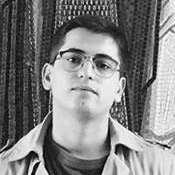[EN] Принимаются заявки на участие в конференции «Гуманитарные и социальные науки в России: изобретение научного языка и перевода»
HUMAN AND SOCIAL SCIENCES IN RUSSIA: INVENTION OF SCIENTIFIC LANGUAGE AND TRANSLATION Call for papers for a conference in Paris, 24-25 May 2013, held as part of the ANR “Schusocru” research project: “The constitution of human and social sciences in Russia: networks and circulation of models of knowledge from the 18th century to the 1920s” […]
 1 766
1 766 
© www.flickr.com/people/emdot/
HUMAN AND SOCIAL SCIENCES IN RUSSIA: INVENTION OF SCIENTIFIC LANGUAGE AND TRANSLATION
Call for papers for a conference in Paris, 24-25 May 2013, held as part of the ANR “Schusocru” research project: “The constitution of human and social sciences in Russia: networks and circulation of models of knowledge from the 18th century to the 1920s”
From the 18th century, the constitution of scientific fields in Russia, particularly in what are known as the human sciences, followed many paths but it was largely based on transfers, borrowings, and implantations from Western Europe in the creation of institutions, the education of specialists, and the circulation of books. Against that background, the invention of scientific language in the various disciplines is of particular interest and merits historical research. This topic immediately raises another question, namely which national language was used to transmit knowledge. Use of the languages in which the knowledge was originally written (Latin, French, German, etc.), known not only by practitioners from the scholarly centres of Europe, but also by the first Russian specialists, was soon paralleled by the end of the 18th century by translations into Russian of Western scholarly publications. These included those published in Russia in their original languages, as at the Academy of Sciences. Later, in some rare, but significant cases, Russian works were translated in Western languages. As a result, translation became a process of cultural exchange and of construction of science; it led to an intense labour of linguistic adaptation and invention, first of lexical terms and then of syntax, of a scope and scale that need to be measured: the language of science, an object of invention, immediately became an object for communication, education and public instruction.
The history of these developments in Russia remains largely unexplored. Although a few disciplines, such as philosophy (almost by definition), sociology, linguistics, psychology, economics and history (particularly Begriffsgeschichte), have been covered by this sort of examination and research, Russia has been little involved in these approaches, except for those fields where major discoveries were made that transcended “Russian”, such as the literary and linguistic studies of the first third of the 20th century. But this examination is sparse, fragmentary and, not least, not sufficiently supported by close diachronic study of phenomena often thought of as beyond time and space. The history of scholarly translations is at best touched upon in monographs on the reception in Russia of a particular author (philosopher, say, or historian). The history of the key concepts that were used to constitute scientific discourse, translated or transcribed from “scholarly” languages and then gaining a life of their own in Russian, is virtually a blank sheet.
The conference will be a first step to remedy this. Its relative novelty encourages us to cover a vast field both in chronology and number of disciplines. The chosen period stretches from the mid-18th century up to and including the 1920s. These dates (also those of the ANR “Schusocru” research project to which the conference belongs) cover the beginnings of the human sciences in Russia and the invention of the social sciences just before the Great Turn of the 1930s and display a certain continuity for our purposes. The disciplines covered are the human and social sciences as a whole.
The papers we expect may be devoted to micro-study(a word, a concept, a book, an author, etc.) or wider views, including cross-disciplinary work. Without restricting the scope of possibilities for specialists interested in this project for their own field, we would emphasise the following points:
• The presence of foreign books and foreign languages in scholarly centres. This type of research does not concern only the early period. Even at the start of the 20th century, the question of acquiring basic works and learning essential languages was still sufficiently problematic for the topic to remain relevant. The study of libraries, both university and private, and of modes of acquisition, standard matters for book historians, has much to contribute here. And the scholarly use of Latin, German and Russian in certain institutions exposed to multilingualism by their design (Academy of Sciences) or location (Universität Dorpat ) is another way of addressing the same topic. It may be possible to establish a general or more detailed periodization for a given scholarly field as a function (among others) of the rise and fall of interest in foreign publications.
• Periodization and background of translations. It is particularly important to examine the early period of translation, when it was argued to be necessary for educational purposes (by the historian Pogodin in the early 1830s, for example), but the question remains valid even when, at the end of the 19th century, translations from French, German and English were to some extent commonplace. The choice of books to be translated, the identity of the translator, the translator’s resources, the choices made in translating words difficult to transpose (neologism by use of the original word or calque, use of an existing Russian word, transcription) are often of interest. A simple bibliographical or statistical analysis of translations may lead on to further questions. For example, did the emerging nationhood that affected the human sciences to an extent as yet unknown, including scientific discourse, have any influence on translation and if so of what sort? This “national” angle may also lead to other periodizations, as mentioned above.
• Translation as access to universality. When citing foreign authors or describing realities outside Russia, specialists would sometimes deliberately choose terms taken from a specifically Russian lexical field, referring to specifically Russian realities. This approach (equivalent terms = equivalent realities) may form the foundation for constructions that transcend national borders. It was adopted, for example, by the historian Pavlov-Sil’vanskij, to assert the existence of a Russian “feudalism” equivalent to the “feudalism” in Western Europe. This goes beyond the issue of translation and is rather an attempt at breaking down boundaries (or generalising or deleting local features), which may be particularly significant in the social sciences (history, sociology, ethnography), with many examples in the early 20th century. Translation of Russian texts in Western languages was a part of the same process.
• Cross-disciplinary diffusion. The importance of a given discipline at a given moment in the study period may have played a part in the adoption of words and phrases, and consequently topics from other fields. The dominance of linguistics around the year 1900, of French and British sociology in Russian social sciences, are reasons to consider transfers not only, and not so much, from one language to another, one discipline to another, but more transversally (several languages, several disciplines). It would be instructive to examine to what extent vigorous scientific movements such as Russian formalism, “social” history and Orientalism, were largely determined by linguistic configurations specific to Russian universities.
The conference will be held in Paris on 24-25 May 2013. Conference languages will be French, Russian and English. Those who wish to take part are invited to send us the topic of their paper and a brief description (between 10 lines and a page) by 30 September 2012 at the latest.
Elena Astafieva and Wladimir Berelowitch, Schusocru project coordinators,
Members of CERCEC (Centre d’études des Mondes russe, caucasien et centre-européen), EHESS/CNRS
([email protected], [email protected])




Комментарии